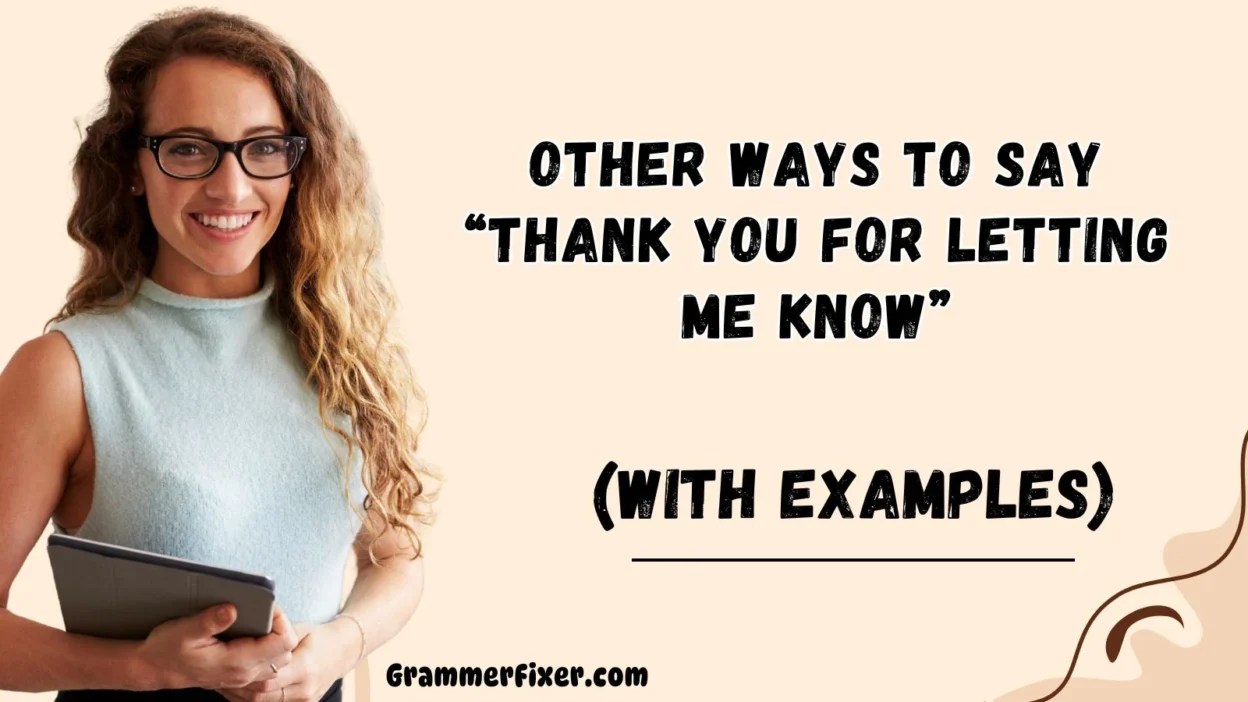In both professional and personal communication, finding the right words can make all the difference. A simple “Thank you for letting me know” is respectful, but at times it may feel a little generic or overused.
Whether you’re responding to an update from a colleague, a notification from a client, or a thoughtful message from a friend, having a variety of warm, polished, and thoughtful alternatives helps you connect better and show genuine appreciation.
Below are 30 carefully selected alternatives that add more depth, context, and personal touch to your communication.
What Does “Thank You for Letting Me Know” Mean?
“Thank you for letting me know” is a phrase commonly used to acknowledge information that someone has shared with you. It expresses gratitude, awareness, and consideration. It’s often used in professional environments when responding to updates, instructions, or heads-ups.
The phrase shows that you are listening, staying informed, and value transparent communication.
Is It Professional/Polite to Say “Thank You for Letting Me Know”?
Yes, it is both professional and polite. It strikes a balance between courtesy and clarity, and it’s suitable for emails, meetings, feedback, or conversations with clients, managers, or colleagues.
However, varying your expression with synonyms adds empathy, style, and nuance, especially in contexts like client relationships, team communication, or sensitive updates.
Advantage or Disadvantage of Using “Thank You for Letting Me Know”
Advantages:
- Clear and respectful
- Shows attentiveness
- Appropriate in most settings
Disadvantages:
- Can sound impersonal or robotic with overuse
- Lacks specific emotional depth
- May not feel suitable for sensitive or casual conversations
1. I Appreciate the Update
Meaning: You are grateful that someone shared new or recent information with you.
Detailed Explanation: This is a more active way to thank someone, emphasizing your acknowledgment and value for being informed.
Scenario Example:
“Thanks, Sarah. I appreciate the update on the project timeline.”
Best Use: Email responses to coworkers or clients.
Tone: Professional, polite, appreciative
2. Thanks for Keeping Me in the Loop
Meaning: You value being included in the ongoing flow of communication.
Detailed Explanation: Suggests appreciation for transparency and updates, particularly in team settings.
Scenario Example:
“Thanks for keeping me in the loop—this helps with planning our next steps.”
Best Use: Team discussions, project planning.
Tone: Friendly, collaborative, engaged
3. Grateful for the Heads-Up
Meaning: Expresses thanks for being warned or alerted about something in advance.
Detailed Explanation: Useful when someone helps you prepare, avoid issues, or adapt to upcoming changes.
Scenario Example:
“Grateful for the heads-up about the new compliance rules.”
Best Use: Policy changes, schedule adjustments, risk alerts
Tone: Appreciative, informal to semi-formal
4. Thanks for Reaching Out
Meaning: You acknowledge the effort someone made to contact or inform you.
Detailed Explanation: Often used when someone shares news, concerns, or feedback proactively.
Scenario Example:
“Thanks for reaching out and letting me know about the meeting change.”
Best Use: Emails, client communication, feedback loops
Tone: Empathetic, thoughtful, open
5. Noted with Thanks
Meaning: You’ve acknowledged the information and are grateful for it.
Detailed Explanation: A concise and formal way to show you’ve received and recorded the information.
Scenario Example:
“Noted with thanks. I’ll adjust my calendar accordingly.”
Best Use: Formal messages, admin replies, update confirmations
Tone: Professional, concise, efficient
6. Appreciate the Heads-Up
Meaning: Similar to “Grateful for the heads-up,” but slightly more casual.
Detailed Explanation: Great for everyday work updates or when someone flags an issue for your attention.
Scenario Example:
“Appreciate the heads-up about the traffic delays.”
Best Use: Slack, workplace chats, quick emails
Tone: Casual, thankful, friendly
7. Good to Know, Thanks
Meaning: You acknowledge that the info shared is helpful and relevant.
Detailed Explanation: More laid-back, yet effective in casual professional environments.
Scenario Example:
“Good to know, thanks! I’ll keep that in mind for our next meeting.”
Best Use: Friendly coworker exchanges, informal updates
Tone: Friendly, casual, conversational
8. I’m Glad You Told Me
Meaning: Expresses emotional relief or appreciation that someone chose to inform you.
Detailed Explanation: Works well when someone shares personal, critical, or sensitive updates.
Scenario Example:
“I’m glad you told me. That helps us rethink our strategy.”
Best Use: Managerial chats, sensitive topics
Tone: Empathetic, sincere, warm
9. Thanks for the Notification
Meaning: You’re acknowledging a formal alert or system-based message.
Detailed Explanation: Suitable for automated emails, admin notices, or policy-related communication.
Scenario Example:
“Thanks for the notification. We’ll update our procedures accordingly.”
Best Use: Legal, admin, operations updates
Tone: Professional, formal
10. Appreciate the Insight
Meaning: You value the information and analysis shared.
Detailed Explanation: Best when someone gives feedback, recommendations, or observations.
Scenario Example:
“Appreciate the insight—it really clarified our next steps.”
Best Use: Feedback, training, discussions
Tone: Thoughtful, respectful
11. Thanks for Sharing That
Meaning: Acknowledge and appreciate that someone shared useful or personal information.
Detailed Explanation: This phrase creates a sense of openness and trust, whether the shared information is logistical or emotional.
Scenario Example:
“Thanks for sharing that—it’s helpful to understand where you’re coming from.”
Best Use: Feedback, 1:1 conversations, team updates
Tone: Empathetic, respectful, thoughtful
12. I Value the Information
Meaning: You truly appreciate the relevance and usefulness of the update.
Detailed Explanation: Great for emphasizing the importance of shared input, especially in decision-making or strategic planning.
Scenario Example:
“I value the information you provided about the client’s concerns.”
Best Use: Strategic meetings, client relations, leadership discussions
Tone: Professional, appreciative, considered
13. Thank You for Bringing This to My Attention
Meaning: A formal, respectful way to show appreciation for someone highlighting something important.
Detailed Explanation: Ideal when someone alerts you to an issue, error, or something needing action.
Scenario Example:
“Thank you for bringing this to my attention. I’ll review it with the team.”
Best Use: Issues, concerns, client service, error resolution
Tone: Formal, proactive, responsible
14. I Appreciate the Heads-Up
Meaning: You’re grateful that someone gave you advance warning or timely notice.
Detailed Explanation: Works especially well in situations involving schedule changes, risks, or disruptions.
Scenario Example:
“I appreciate the heads-up—I’ll prepare accordingly.”
Best Use: Timely updates, meeting adjustments, team alerts
Tone: Polite, cooperative, aware
15. Thanks for the Clarification
Meaning: You’re thanking someone for explaining or resolving confusion.
Detailed Explanation: Great for clearing up misunderstandings or ambiguity in messages or instructions.
Scenario Example:
“Thanks for the clarification on the client’s expectations.”
Best Use: Emails, meetings, team collaboration
Tone: Appreciative, respectful, focused
16. Noted, Thanks for Letting Me Know
Meaning: You’ve registered the information and appreciate being updated.
Detailed Explanation: Combines acknowledgment and gratitude, and is especially useful in quick, professional responses.
Scenario Example:
“Noted, thanks for letting me know. I’ll adjust the agenda.”
Best Use: Slack/Teams chats, project tracking, quick replies
Tone: Efficient, polite, concise
17. That’s Helpful—Thank You
Meaning: You are explicitly appreciating the usefulness of the shared info.
Detailed Explanation: Reinforces that the update has made a positive impact on your understanding or decisions.
Scenario Example:
“That’s helpful—thank you for explaining the new deadlines.”
Best Use: Instructional or project-based communication
Tone: Supportive, thoughtful, appreciative
18. I’m Grateful for the Update
Meaning: A more heartfelt version of “Thanks for the update.”
Detailed Explanation: Shows a deeper sense of gratitude, suitable for important or high-stakes updates.
Scenario Example:
“I’m grateful for the update. This helps us move forward confidently.”
Best Use: Executive communication, leadership updates
Tone: Grateful, respectful, sincere
19. Appreciate You Keeping Me Posted
Meaning: Shows thanks for being kept informed regularly.
Detailed Explanation: Implies trust and value in the ongoing nature of the communication.
Scenario Example:
“Appreciate you keeping me posted on the client’s feedback.”
Best Use: Ongoing projects, relationship management
Tone: Friendly, professional, consistent
20. Acknowledged—Thanks for the Info
Meaning: Confirms receipt of the information and shows appreciation.
Detailed Explanation: Common in workflow tools, status updates, or automated responses, but still polite.
Scenario Example:
“Acknowledged—thanks for the info. I’ve added it to the deck.”
Best Use: Task tracking, status updates, internal messages
Tone: Clear, direct, professional
21. Got It—Thank You!
Meaning: Informal way of acknowledging information and expressing thanks.
Detailed Explanation: Works well in fast-paced or casual team environments.
Scenario Example:
“Got it—thank you! I’ll follow up with the client.”
Best Use: Internal chats, informal emails
Tone: Light, casual, responsive
22. Thanks for the Prompt Update
Meaning: You appreciate how quickly someone got back to you.
Detailed Explanation: Acknowledges timeliness, which is essential in collaborative work and urgent tasks.
Scenario Example:
“Thanks for the prompt update—that really helped us meet the deadline.”
Best Use: Fast-paced workflows, project management
Tone: Grateful, efficient, courteous
23. Thank You for Informing Me
Meaning: A slightly more formal, structured way to acknowledge being told something.
Detailed Explanation: Best for external communication, documentation, or legal/formal replies.
Scenario Example:
“Thank you for informing me of the staffing changes.”
Best Use: Policy, HR, formal announcements
Tone: Formal, clear, neutral
24. Much Appreciated
Meaning: A warm, slightly casual expression of genuine thanks.
Detailed Explanation: Can be used alone or paired with a sentence for short, kind replies.
Scenario Example:
“Much appreciated—I’ll bring this up at the briefing.”
Best Use: Everyday professional gratitude
Tone: Polite, conversational, warm
25. Thanks for the Heads-Up—It Helps
Meaning: Thanks for the advance notice and emphasizing its impact.
Detailed Explanation: Makes your appreciation more specific and personal.
Scenario Example:
“Thanks for the heads-up—it helps us realign the schedule.”
Best Use: Project adjustments, planning, coordination
Tone: Thoughtful, proactive, grateful
26. Thank You for the Detailed Info
Meaning: You appreciate the depth and completeness of the information shared.
Detailed Explanation: Encourages people to be thorough and clear, especially on complex tasks.
Scenario Example:
“Thank you for the detailed info—I now have everything I need to proceed.”
Best Use: Reports, data, briefs
Tone: Appreciative, thorough, informative
27. That Was Invaluable—Thank You
Meaning: Expresses high praise for the impactful nature of the info received.
Detailed Explanation: Emphasizes the importance and usefulness of the contribution.
Scenario Example:
“That was invaluable—thank you for your insights during the planning session.”
Best Use: Feedback, brainstorming, strategy
Tone: Sincere, high praise, motivational
28. Thank You for the Consideration
Meaning: Expresses appreciation for someone thinking of you when sharing something.
Detailed Explanation: Highlights empathy and thoughtfulness in the communication.
Scenario Example:
“Thank you for the consideration—I’ll take it into account.”
Best Use: Thoughtful suggestions, shared preferences, input
Tone: Appreciative, caring, respectful
29. I Appreciate Your Transparency
Meaning: You value the honesty and openness in the message.
Detailed Explanation: Encourages a culture of trust, great in leadership and team roles.
Scenario Example:
“I appreciate your transparency about the risks involved.”
Best Use: Conflict resolution, updates on challenges
Tone: Trust-building, warm, encouraging
30. Thanks for Looping Me In
Meaning: Thanks for being included in an ongoing conversation or thread.
Detailed Explanation: Common in team emails and cross-functional projects.
Scenario Example:
“Thanks for looping me in—I’ll review and get back shortly.”
Best Use: Emails, project updates, cross-team communication
Tone: Casual-professional, collaborative, inclusive
Conclusion
Using thoughtful alternatives to “Thank you for letting me know” can greatly enhance your professional communication, foster stronger relationships, and ensure your tone is aligned with your message’s context. Whether you’re acknowledging feedback, reacting to a policy change, or simply appreciating someone for keeping you informed, the right words make your response memorable, respectful, and human.
By choosing from this versatile list, you build a richer communication repertoire—one that promotes open dialogue, trust, and emotional intelligence. Add these options to your daily conversations to sound more engaged, polished, and thoughtfully responsive.



